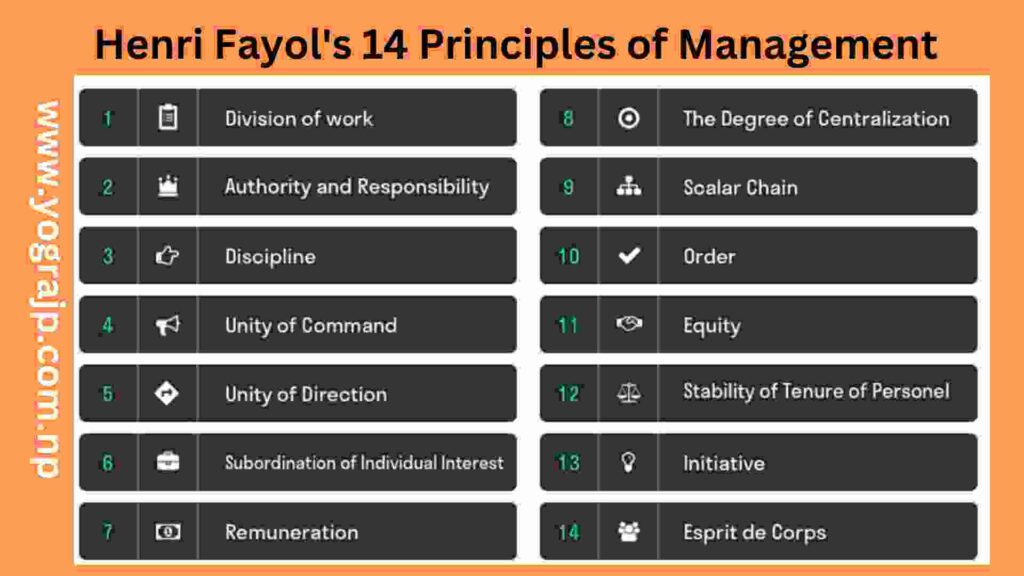Welcome to our blog post on the “14- Principles of Management“ by Henri Fayol. In this article, we’ll explore the foundational principles proposed by Fayol that have significantly influenced modern management practices. Whether you’re a business professional, a student of management theory, or simply curious about the principles that shape organizational success, this article aims to provide insight into Fayol’s timeless principles. Join us as we delve into each principle, examining its relevance and application in today’s dynamic business environment. Let’s embark on a journey to uncover the core principles that continue to guide management practices worldwide.
Principles of Management– Good management is necessary for any organization to succeed and reach its objectives. The planning, organizing, leading, and controlling (POLC) framework comprises four fundamental managerial functions. An organization would lack focus and structure if these weren’t in place. Henri Fayol’s 1916 book “Administration Industrielle et Générale” contained a famous theory on the fundamentals of management. These concepts provide the groundwork for what we call “good management” by emphasizing managerial abilities over technical ones.
Principles of Management Explain, Meaning, and Definition.
The term “principles of management” refers to the essential rules or guidelines that control how organizations are managed successfully. These guidelines give managers a solid basis on which to decide, act, and efficiently accomplish corporate objectives. They come from observations, firsthand knowledge, and analysis of effective management techniques over an extended period.
The ability of Principles of Management to give managers a framework for comprehending and handling the different problems and circumstances they come across in their jobs is what gives them their meaning. Planning, organizing, leading, and controlling are only a few of the many crucial management tasks that are covered by these broad principles.
Essentially, the definition of Principles of Management summarizes the basic ideas and theories that support the field of management. In order to ensure organizational performance, they provide managers with insights about how to best utilize resources, inspire workers, encourage creativity, and adjust to shifting conditions.
In general, the Principles of Management act as beacons of guidance for managers, assisting them in navigating the intricacies of organizational dynamics and realizing long-term success and progress.
Principles of Management Function
The principles of management function refer to the fundamental guidelines or rules that govern the key functions of management. These principles are derived from observations, experiences, and analyses of successful management practices. They provide managers with a framework for effectively carrying out the various functions of management, which include planning, organizing, leading, and controlling.
- Planning:
This function involves setting organizational goals, determining the best course of action to achieve those goals, and developing strategies and plans to guide the organization toward success. Principles of management related to planning include clarity of objectives, flexibility, alignment with organizational goals, and thoroughness in considering alternatives. - Organizing:
Organizing involves arranging resources, such as people, materials, and finances, in a way that facilitates the achievement of organizational goals. Principles of management related to organizing include clarity of organizational structure, delegation of authority and responsibility, coordination among departments, and creating an environment conducive to collaboration and productivity. - Leading:
Leading involves inspiring and motivating employees to work toward the attainment of organizational goals. Principles of management related to leading include effective communication, providing direction and guidance, fostering teamwork, empowering employees, and leading by example. - Controlling:
Controlling involves monitoring organizational performance, comparing it to established goals, and taking corrective action when necessary to ensure that goals are achieved. Principles of management related to controlling include establishing performance standards, measuring performance, identifying deviations, taking corrective action, and ensuring accountability.
These principles of management function collectively guide managers in effectively carrying out their responsibilities and achieving organizational success. They provide a framework for decision-making, problem-solving, and managing resources in a manner that maximizes efficiency and effectiveness.
Who Was Henri Fayol?
Henri Fayol was a French mining engineer, management theorist, and industrialist who lived from 1841 to 1925. He is widely regarded as one of the founding fathers of modern management theory. Fayol is best known for his development of the “14 Principles of Management” and his contributions to the administrative management theory.
Fayol’s ideas were groundbreaking for his time, as he emphasized the importance of management as a distinct discipline separate from technical skills. He believed that management principles could be applied universally across different industries and organizations. Fayol’s principles provided a framework for managers to effectively organize and manage their operations.
Some of Fayol’s most well-known principles include unity of command, division of work, authority and responsibility, discipline, and equity. These principles laid the groundwork for many of the management practices that are still in use today.
In addition to his principles, Fayol also proposed a comprehensive theory of management that included functions such as planning, organizing, commanding, coordinating, and controlling. His work helped to shape the field of management theory and laid the foundation for later developments by other theorists such as Max Weber and Frederick Taylor.
Overall, Henri Fayol’s contributions to management theory have had a lasting impact on the practice of management and continue to be studied and applied in organizations around the world.
Henry Fayol’s 14 Principles of Management
Henry Fayol’s 14 management principles take a top-down view of an organization to assist managers in getting the most out of workers and managing the company smoothly. Let us examine and gain a thorough understanding of them.

1. Division of Work:
The principle of Division of Work, also known as specialization, emphasizes the importance of breaking down tasks into smaller, more manageable components and assigning them to individuals based on their skills and expertise. This division allows employees to focus on specific aspects of a task or process, leading to increased efficiency and productivity. Here’s an explanation of the principle along with an example:
Explanation:
The Division of Work principle suggests that when tasks are divided among individuals based on their specialization and expertise, they can perform their responsibilities more efficiently. By focusing on a specific aspect of the overall work, employees can develop proficiency in their area, leading to higher quality outcomes and faster completion times. This principle is grounded in the idea that individuals can become more skilled and efficient when they concentrate on a particular aspect of their work rather than trying to handle multiple tasks simultaneously.
Example:
Consider a manufacturing company that produces automobiles. Instead of having each worker assemble an entire car from start to finish, the production process is divided into specialized tasks. For instance, one group of workers might be responsible for installing engines, another for fitting doors, and another for attaching wheels. By dividing the work in this manner, each employee can focus on mastering their specific task, leading to greater efficiency and higher-quality output.
In this example, the principle of Division of Work ensures that each employee becomes highly skilled in their particular area of expertise, leading to smoother operations and improved overall performance for the manufacturing company.
2. Authority and Responsibility
The principle of Authority and Responsibility outlines the relationship between the ability to give orders (authority) and the obligation to ensure tasks are completed (responsibility) within an organization. According to this principle, managers who have the authority to give orders also bear the responsibility for the outcomes of those orders. Here’s an explanation of the principle along with an example:
Explanation:
Authority refers to the legitimate power that a manager possesses to direct the actions of subordinates, make decisions, and allocate resources within an organization. Responsibility, on the other hand, refers to the obligation of an individual to perform assigned tasks and be answerable for the outcomes of those tasks. The principle of Authority and Responsibility asserts that these two aspects are inherently linked: those who have the authority to give orders must also bear the responsibility for ensuring that those orders are carried out effectively.
Example:
In a retail company, the store manager has the authority to make decisions regarding inventory management, staffing levels, and customer service policies. As part of their authority, the store manager assigns specific tasks to employees, such as restocking shelves, assisting customers, and processing transactions. However, along with this authority comes the responsibility to ensure that these tasks are completed efficiently and effectively.
For instance, if the store manager instructs an employee to restock shelves before the store opens, they are responsible for ensuring that the shelves are adequately stocked and organized promptly. If the shelves are not properly restocked and this leads to customer complaints or a decrease in sales, the store manager bears the responsibility for the outcome.
In this example, the principle of Authority and Responsibility highlights the interconnectedness between the ability to give orders and the obligation to ensure tasks are completed. Managers must understand and accept their responsibility for the outcomes of their decisions and actions, even as they exercise their authority within the organization.
3. Discipline
The principle of Discipline in management emphasizes the importance of establishing and maintaining discipline within an organization. This involves ensuring that employees adhere to established rules, policies, and agreements and that disciplinary actions are taken when necessary fairly and consistently. Here’s an explanation of the principle along with an example:
Explanation:
Discipline is crucial for creating a productive and harmonious work environment. It involves enforcing rules and regulations to ensure that employees behave in a manner that is conducive to achieving organizational goals. Discipline helps maintain order, consistency, and fairness within the workplace, promoting respect for authority, adherence to standards, and accountability for one’s actions. Effective discipline can lead to higher morale, increased productivity, and a positive organizational culture.
Example:
In a manufacturing plant, there are strict safety protocols in place to protect employees from accidents and injuries. These protocols include wearing personal protective equipment (PPE), following proper procedures for operating machinery, and adhering to safety guidelines at all times. The management team is responsible for enforcing these rules and ensuring that all employees comply with them.
If an employee is found violating safety protocols by not wearing their required PPE while working in the plant, the management must take disciplinary action. This might involve issuing a verbal warning for a first offense, followed by a written warning for subsequent offenses. If the employee continues to disregard the safety rules despite warnings, more severe disciplinary measures such as suspension or termination may be necessary.
By enforcing discipline in this manner, the organization demonstrates its commitment to maintaining a safe work environment and protecting the well-being of its employees. It also sends a clear message that violating rules and regulations will not be tolerated, promoting a culture of accountability and responsibility among the workforce.
In this example, the principle of Discipline underscores the importance of enforcing rules and regulations to ensure the safety and well-being of employees, as well as the overall effectiveness and efficiency of the organization.
4. Unity of Command
The principle of Unity of Command in management states that each employee within an organization should receive orders and instructions from only one superior or manager. This principle helps to avoid confusion, conflicting priorities, and potential misunderstandings by ensuring clear lines of communication and accountability. Here’s an explanation of the principle along with an example:
Explanation:
Unity of Command emphasizes the importance of a hierarchical structure within an organization, where each employee reports to and receives instructions from a single designated authority figure. This ensures that employees know exactly who they are accountable to and prevents them from receiving conflicting directives from multiple managers. By adhering to the principle of Unity of Command, organizations can maintain clarity, consistency, and efficiency in their operations.
Example:
In a marketing department, there are several teams responsible for different aspects of the marketing strategy, including advertising, social media, and market research. Each team has its manager who oversees the activities and performance of team members.
If a member of the advertising team is working on a project and receives instructions from their manager to revise a particular campaign, they should follow those instructions without seeking input or direction from other managers within the department. By adhering to the principle of Unity of Command, the employee avoids confusion and ensures that their efforts are aligned with the goals and priorities set by their direct supervisor.
However, if the same employee were to receive conflicting instructions from multiple managers within the department, it could lead to confusion, delays, and potentially suboptimal outcomes for the project. This highlights the importance of Unity of Command in providing clear direction, maintaining accountability, and facilitating effective decision-making within the organization.
In this example, the principle of Unity of Command helps to streamline communication and coordination within the marketing department, enabling employees to focus on their assigned tasks and contribute to the overall success of the organization.
5. Unity of Direction
The principle of Unity of Direction in management asserts that all activities within an organization should be directed toward the achievement of a common set of goals and objectives. This principle emphasizes the importance of aligning individual efforts and departmental activities with the overall mission and strategic direction of the organization. Here’s an explanation of the principle along with an example:
Explanation:
Unity of Direction emphasizes the need for coherence and coordination in organizational efforts. It suggests that all departments, teams, and individuals should work together towards a shared vision and common objectives. By ensuring that everyone is moving in the same direction, organizations can maximize efficiency, minimize duplication of efforts, and achieve their goals more effectively.
Example:
Consider a software development company that aims to launch a new product in the market. The company’s leadership establishes a clear vision for the product and defines specific objectives, such as delivering the product on time, meeting quality standards, and capturing a certain percentage of market share.
To ensure Unity of Direction, the company’s various departments and teams, including product development, marketing, sales, and customer support, align their activities with the overarching goal of launching the new product successfully. For instance, the product development team focuses on designing and building the software according to customer requirements and quality standards, while the marketing team develops strategies to create awareness and generate interest among potential customers.
Additionally, all decisions and initiatives undertaken by different departments are guided by the shared goal of launching the new product, ensuring that resources are allocated efficiently and efforts are coordinated towards achieving the desired outcomes.
By maintaining Unity of Direction, the software development company can avoid conflicting priorities, optimize resource utilization, and enhance collaboration among its employees. This ultimately increases the likelihood of achieving success in the competitive marketplace.
In this example, the principle of Unity of Direction underscores the importance of aligning organizational activities with overarching goals and objectives to maximize effectiveness and achieve desired outcomes.
6. Collective Interest Over Individual Interest
The principle of Collective Interest Over Individual Interest emphasizes prioritizing the goals and welfare of the organization as a whole over the interests of individual employees or groups. This principle encourages employees to work together towards common objectives rather than pursuing personal agendas that may conflict with the organization’s success.
Example:
In a project team, team members may have different ideas about how to approach a task. However, instead of insisting on their individual preferences, they collaborate and compromise to find the best solution for the project’s success. This ensures that the collective interest in completing the project effectively takes precedence over individual opinions or desires.
7. Remuneration
The principle of Remuneration in management refers to the fair and equitable compensation provided to employees for their work and contributions to the organization. It involves ensuring that employees receive appropriate financial and non-financial rewards that align with their skills, responsibilities, and performance levels.
Example:
In a software company, employees are compensated based on factors such as their level of expertise, job responsibilities, and contributions to the development of successful projects. This may include competitive salaries, bonuses for exceptional performance, and opportunities for career advancement or professional development. By offering fair and competitive remuneration packages, the company can attract and retain top talent, motivate employees to perform at their best, and foster a culture of excellence and commitment.
8. Centralization
The principle of Centralization in management refers to the degree to which decision-making authority is concentrated within a specific level or group of individuals within an organization. In a centralized structure, key decisions are made by a small group of top-level managers or executives, while in a decentralized structure, decision-making authority is distributed among multiple levels or individuals throughout the organization.
Example:
In a centralized organization, major strategic decisions, such as mergers and acquisitions or significant changes in company policies, are made by the CEO and the senior management team. This ensures that key decisions are aligned with the organization’s overall goals and objectives and are implemented consistently across all departments and divisions. However, in a decentralized organization, decision-making authority may be delegated to lower-level managers or individual departments, allowing for more flexibility and responsiveness to local needs and conditions.
9. Scalar Chain
The principle of the Scalar Chain in management refers to the formal chain of authority and communication that exists within an organization. It describes the hierarchical structure through which information, instructions, and decisions flow from higher levels of management to lower levels and vice versa. The scalar chain ensures that there is a clear and unbroken line of communication and authority from the top of the organization to the bottom.
Example:
In a manufacturing company, the scalar chain dictates that information and instructions flow from the CEO and top executives to middle managers, then to supervisors, and finally to frontline workers. For instance, if the CEO decides to implement a new production process, they will communicate this decision to the middle managers responsible for overseeing production operations. The middle managers, in turn, will pass on the instructions to supervisors on the factory floor, who will then ensure that frontline workers understand and implement the new process accordingly. This ensures that communication and directives are transmitted effectively throughout the organization’s hierarchy, facilitating coordination and alignment of efforts.
10. Order
The principle of Order in management refers to the systematic arrangement of resources and activities within an organization to promote efficiency and effectiveness. It involves organizing physical and human resources in a logical and structured manner to minimize waste, confusion, and inefficiencies.
Example:
In a warehouse, the principle of order is evident in the arrangement of inventory items. Products are organized systematically on shelves or in designated storage areas according to categories, such as product type, size, or popularity. Additionally, labeling systems and inventory management software are utilized to ensure accurate tracking and easy retrieval of items when needed. By maintaining order in the warehouse, employees can quickly locate and access inventory items, reducing the time and effort required to fulfill customer orders and improving overall operational efficiency.
11. Equity
The principle of Equity in management refers to the fair and impartial treatment of all employees within an organization. It entails ensuring that individuals are treated with fairness, justice, and respect, regardless of their background, status, or personal characteristics. Equity involves providing equal opportunities, rewards, and recognition based on merit and performance, rather than favoritism or discrimination.
Example:
In a company, equity is demonstrated by implementing policies and practices that promote equal opportunities for career advancement and development. For instance, promotions, raises, and training opportunities are based on employees’ skills, qualifications, and performance evaluations, rather than factors such as gender, race, or personal connections. Additionally, the company may establish mechanisms for employees to voice concerns or grievances and ensure that disciplinary actions are applied consistently and fairly across all levels of the organization. By upholding principles of equity, the company fosters a positive work environment where employees feel valued, respected, and motivated to contribute their best efforts.
12. Stability of Tenure of Personnel
The principle of Stability of Tenure of Personnel in management emphasizes the importance of providing employees with job security and stability in their positions within the organization. It involves minimizing turnover and ensuring continuity by retaining qualified and experienced personnel over an extended period. This principle recognizes that employment stability contributes to employee morale, productivity, and organizational effectiveness.
Example:
In a company that values the stability of tenure of personnel, efforts are made to reduce employee turnover through initiatives such as offering competitive salaries and benefits, providing opportunities for career advancement and professional development, and fostering a positive work culture that promotes employee satisfaction and engagement. Additionally, the company may implement policies to support work-life balance, recognize and reward employee contributions, and provide avenues for open communication and feedback. By prioritizing stability of tenure, the company can retain skilled and experienced employees, reduce recruitment and training costs, and maintain continuity in operations, ultimately contributing to long-term success and sustainability.
13. Initiative
The principle of Initiative in management encourages employees to take proactive and independent action to identify and pursue opportunities for improvement or innovation within the organization. It involves empowering individuals to suggest new ideas, propose solutions to problems, and take ownership of their work responsibilities.
Example:
In a technology company, the principle of initiative is demonstrated when employees are encouraged to explore and implement new technologies or processes that can enhance efficiency, productivity, or customer satisfaction. For instance, a software developer may take the initiative to propose a new feature or functionality for a product based on customer feedback or market trends. Similarly, a marketing manager may initiate a campaign to target a specific segment of the market or experiment with different advertising channels to increase brand awareness. By fostering a culture of initiative, the company can tap into the creativity and expertise of its employees, drive continuous improvement, and stay competitive in a rapidly evolving industry.
14. Esprit de Corps
The principle of Esprit de Corps in management refers to fostering a sense of unity, camaraderie, and team spirit among employees within an organization. It involves promoting a positive work culture where individuals feel valued, supported, and motivated to collaborate towards common goals and shared success.
Example:
In a corporate environment that values Esprit de Corps, efforts are made to cultivate a sense of belonging and teamwork among employees through various activities and initiatives. This may include team-building exercises, social events, recognition programs, and opportunities for cross-functional collaboration. Additionally, leaders and managers actively promote open communication, trust, and mutual respect among team members, encouraging them to celebrate achievements, support each other during challenges, and work together to overcome obstacles. By nurturing Esprit de Corps, the organization can enhance employee morale, engagement, and satisfaction, leading to improved productivity, creativity, and overall performance.
History of the 14 Principles of Management
The 14 Principles of Management were developed by Henri Fayol, a French industrialist, in the early 20th century. Fayol proposed these principles based on his observations and experiences in managing organizations. His goal was to provide a framework that could guide managers in effectively overseeing their operations and achieving organizational goals.
Fayol first introduced his principles in his book “Administration Industrielle et Générale” (Industrial and General Administration), published in 1916. In this book, he outlined the fundamental principles that he believed were essential for successful management.
Over time, Fayol’s principles gained recognition and were widely adopted by managers and scholars around the world. They provided a foundation for understanding the key functions of management and became an integral part of management education and training programs.
Despite being over a century old, the 14 Principles of Management remain relevant today. They continue to inform management practices and serve as a valuable guide for managers in various industries and organizational settings.
In summary, the history of the 14 Principles of Management dates back to the early 20th century when Henri Fayol first introduced them in his book on administration. Since then, they have become widely accepted as fundamental guidelines for effective management.
What Is the Importance of the 14 Principles of Management?
When an organization’s workforce is fully utilized to the fullest extent possible, it can be considered truly successful. Henri Foyal’s 14 management principles continue to have a significant impact on good decision-making and achieving the greatest outcomes for the business and the workforce.
It is commonly acknowledged that Foyal’s management techniques have made workers extremely productive and effective, which has led to the best outcomes and smooth operation of the company. The most significant accomplishments that firms have made by adhering to Henri Fayol’s 14 management principles are listed below.
The 14 Principles of Management hold significant importance for several reasons:
- Guidance for Managers:
They provide a practical framework for managers to understand and carry out their responsibilities effectively. By following these principles, managers can make informed decisions, solve problems, and lead their teams more efficiently. - Universal Applicability:
The principles are applicable across different industries, organizational sizes, and cultural contexts. They offer timeless insights into managing organizations and can be adapted to various situations and challenges. - Enhanced Organizational Performance:
Implementing these principles can lead to improved organizational performance, productivity, and profitability. They help streamline operations, optimize resource utilization, and foster a positive work environment conducive to success. - Clarity and Consistency:
The principles provide clarity and consistency in management practices. They offer a common language and set of guidelines for managers to communicate expectations, make decisions, and evaluate performance consistently across the organization. - Employee Development:
The principles emphasize the importance of empowering and developing employees. By promoting principles such as initiative, equity, and esprit de corps, organizations can foster employee engagement, satisfaction, and professional growth. - Resilience to Change:
The principles help organizations adapt to changing environments and navigate uncertainties more effectively. By focusing on principles such as unity of direction and stability of tenure of personnel, organizations can build resilience and maintain stability during times of transition. - Foundation for Continuous Improvement:
The principles encourage a culture of continuous improvement and innovation. By embracing principles such as order, discipline, and unity of command, organizations can identify areas for improvement, implement changes, and strive for excellence.
Overall, the 14 Principles of Management serve as a valuable guide for managers to lead their organizations toward success by fostering effective communication, coordination, and collaboration among employees, optimizing resource utilization, and aligning efforts with organizational goals and objectives.
Criticism of Fayol’s Principles of Management
Criticism of Henri Fayol’s Principles of Management stems from several key factors. One major point of contention is the lack of empirical evidence supporting these principles, which were largely derived from Fayol’s observations and experiences rather than rigorous research. Critics argue that this raises questions about their validity and applicability in modern organizational contexts. Additionally, Fayol’s emphasis on hierarchical structures and centralized decision-making has been criticized for being rigid and inflexible, potentially hindering innovation and adaptability in today’s dynamic business environment.
Furthermore, some critics argue that these principles may not be universally applicable across diverse cultural and organizational contexts, as they were developed within a specific historical and cultural framework. Another common criticism is the neglect of human factors such as motivation and interpersonal relationships, which are increasingly recognized as crucial aspects of effective management in contemporary organizations. Despite these criticisms, Fayol’s Principles of Management continue to be studied and applied in management education and practice, albeit with a recognition of their limitations and the need for adaptation to modern realities.
Are These Principles of Management Still Relevant Today?
Yes, the Principles of Management proposed by Henri Fayol remain relevant today, albeit with some adaptations to suit modern organizational contexts. While the business landscape has evolved significantly since Fayol’s time, many of the fundamental principles he outlined continue to provide valuable guidance for managers. Concepts such as division of work, unity of command, and unity of direction remain important for promoting efficiency and coordination within organizations.

Principles like equity, stability of tenure, and esprit de corps contribute to fostering positive workplace cultures and employee engagement, which are essential for organizational success in today’s competitive environment. However, it’s important to recognize that these principles may need to be applied flexibly and in conjunction with contemporary management practices to address the complexities of modern business challenges. Overall, while the specifics of management practice may have evolved, the underlying principles proposed by Fayol still offer valuable insights and serve as a foundation for effective management in the 21st century.
Principles of Management Conclusion
In conclusion, the Principles of Management proposed by Henri Fayol continue to hold relevance in today’s business world. These principles offer valuable insights and guidelines for managers to effectively organize, lead, and control their organizations. Concepts like division of work and unity of command help streamline operations and ensure clarity in roles and responsibilities. Meanwhile, principles such as equity and esprit de corps promote positive work cultures that foster employee satisfaction and collaboration.
While the business landscape has evolved, the underlying principles of management remain applicable, albeit with some adaptations to suit modern organizational contexts. Managers need to understand and apply these principles flexibly, taking into account the unique challenges and dynamics of their respective industries and environments. By embracing these principles and combining them with contemporary management practices, organizations can enhance their performance, foster innovation, and achieve sustainable success in today’s competitive markets.
Overall, while the specifics of management practices may vary, the timeless wisdom embedded in Fayol’s Principles of Management continues to provide a solid foundation for effective leadership and organizational management in the 21st century.
Principles of Management Notes
These are some notes you can find out. it helps you
- 10 Best Essential Business Management Techniques You Need to Know
- Maximize Efficiency and Growth: Expert Product and Service Management Solutions
- Why Macroeconomics is the study of the economy as a whole – Best Info
- Understanding Supply and Demand: A Comprehensive Explanation
- The Nature and Scope of Macroeconomics- A Best Guide
FAQ
Q1. What is Fayol’s theory of management?
Fayol’s theory of management emphasizes the need for managers to perform five key functions: planning, organizing, commanding, coordinating, and controlling, in order to achieve organizational goals.
Q2. What are the principles of management?
The principles of management are fundamental guidelines proposed by Henri Fayol to guide effective organizational management.
Q3. Why is Henry Fayol called the father of Management?
Henri Fayol is called the father of management because of his significant contributions to management theory and practice. He developed the 14 Principles of Management and outlined five key functions of management, establishing a foundation for modern management practices.
Q4. What Is the First Rule of Management?
The first rule of management, according to Henri Fayol, is the principle of division of work, which emphasizes breaking tasks into smaller, more manageable components and assigning them to individuals based on their skills and expertise.
Q5. What are the characteristics of principles of Management?
The characteristics of principles of management include being fundamental guidelines, applicable across various industries and contexts, derived from observations and experiences, and providing a framework for effective organizational management.
Q6. What is the nature of the principles of Management?
The nature of the principles of management is universal, timeless, and practical. They provide fundamental guidelines for effective organizational management and are applicable across different industries and contexts.
Q7. What are the benefits of applying Fayol’s principles of management?
There are many benefits to applying Fayol’s principles of management, including:
#Increased efficiency and productivity
#Improved decision-making
#Reduced costs
#Increased employee morale
#Improved customer satisfaction
#Enhanced organizational performance
Q8. What are the types of planning?
The 4 types of planning are strategic, operational, tactical, and contingency planning.
Q9.What are the techniques of management by Henri Fayol?
Henri Fayol’s techniques of management, known as the “14 Principles of Management,” include division of work, authority, discipline, unity of command, unity of direction, subordination of individual interest to the general interest, remuneration, centralization, scalar chain, order, equity, stability of tenure of personnel, initiative, and esprit de corps.






